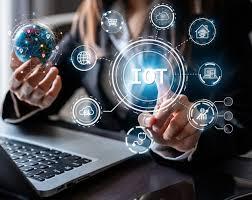Verticals with Rising Demand for IoT-Enabled Solutions

The commercial real estate and hospitality industries, which are focused on the management of physical spaces and the experience of their occupants, represent one of the most significant Leading Verticals With Demand For Iot Solutions Are. In these sectors, IoT technology is being deployed to create "smart buildings" that are more energy-efficient, operationally intelligent, and responsive to the needs of the people inside them. The core market drivers are the dual imperatives of reducing substantial operational costs—primarily energy consumption—and enhancing the occupant experience to attract and retain tenants or guests. A smart building is equipped with a comprehensive network of sensors that monitor everything from energy usage and HVAC performance to room occupancy and indoor air quality. This data is integrated into a central Building Management System (BMS), providing facility managers with a holistic, real-time view of the building's performance and enabling a shift from reactive maintenance to data-driven optimization and predictive management.
A primary and highly impactful application of IoT in smart buildings is the optimization of Heating, Ventilation, and Air Conditioning (HVAC) systems. HVAC systems are typically the single largest consumer of energy in a commercial building, often accounting for 40% or more of total energy usage. In a traditional building, these systems run on fixed schedules, often heating or cooling empty rooms and wasting significant amounts of energy. IoT changes this dynamic completely. Occupancy sensors, such as motion detectors or even more advanced people-counting cameras, can determine in real-time which rooms and floors are occupied. This data is fed to the BMS, which can then automatically adjust the temperature, ventilation, and lighting in unoccupied zones, drastically reducing energy consumption without impacting occupant comfort. Furthermore, IoT sensors placed on HVAC equipment like chillers, boilers, and air handling units can monitor their performance and health, enabling predictive maintenance that prevents costly equipment failures and ensures the system is always running at peak efficiency. The energy savings generated by these optimizations often provide a rapid return on investment for smart building projects.
In the hospitality sector, IoT is being used to create a more personalized and seamless guest experience. The concept of the "connected guest room" is a prime example. Guests can use a smartphone app or a in-room tablet to control lighting, temperature, curtains, and the television. They can also use the app to order room service, request housekeeping, or communicate with the concierge. This level of control enhances convenience and personalizes the stay. For the hotel, this technology also provides operational benefits. When a guest checks out, the system can automatically set the room's HVAC to an energy-saving mode. The system can also alert housekeeping staff that the room is vacant and ready to be cleaned, improving operational efficiency. The Leading Verticals With Demand For Iot Solutions Are size is projected to grow USD 2426.55 Billion by 2035, exhibiting a CAGR of 15.01% during the forecast period 2025-2035. By leveraging IoT to enhance both guest satisfaction and back-end efficiency, hotels can create a strong competitive differentiator, improve their brand reputation, and optimize their operational profitability.
Top Trending Reports -
- Business
- Art
- Causes
- Crafts
- Dance
- Drinks
- Film
- Fitness
- Food
- Giochi
- Gardening
- Health
- Home
- Literature
- Music
- Networking
- Altre informazioni
- Party
- Religion
- Shopping
- Sports
- Theater
- Wellness
- Technology
- Cryptocurrency
- Psychology
- Internet
- Ecommerce
- Family
- Others


